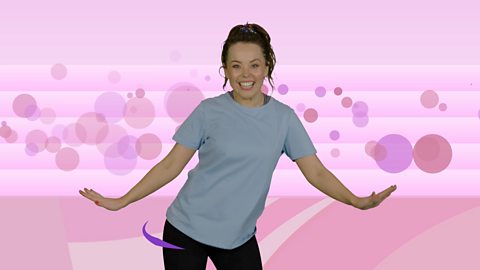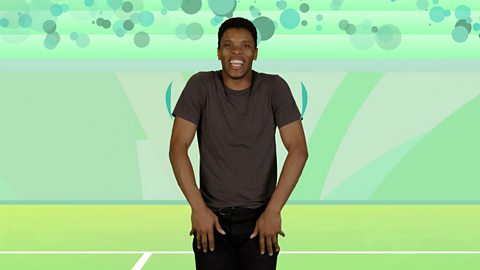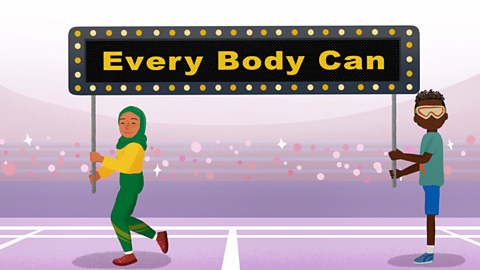As a teacher, you will know your children best, and you know how to tailor lessons to meet their specific needs.
If you're new to teaching, or are just getting to grips with inclusive sports, the Premier League Foundation's community coaches share their top tips on how to prepare an inclusive PE lesson, to help you feel confident teaching the Super Movers for Every Body sports in school.
Rhys Stephenson:There's lots of ways that you can teach sport inclusively, including adapting your existing lessons to better suit the specific needs of the children in your class. So, we've put together a few top tips on how you can do this and why it's important.
Jena Theed, Aston Villa Foundation:For a teacher to adapt the lesson for their specific class, I think it's important to remember that they know the children best. They know what works for them and the strategies that they can use to teach the children in the classroom.
Will Marriot, Leeds United Foundation:Before you even start delivering, so important that you're planning right. The best way to do that is to have an intended outcome and an objective.
Ellie Stuart, Burnley FC in the community:Set clear objectives within your lessons.
Brad Carter, Swindon Town FC FoundationSo they know what to expect, what's coming up and when the breaks are.
Dom Barnes, Burnley FC in the community:Simplicity is key. So, don't try and overcomplicate all the sessions, just try and get all the kids in, keep the level of information low so that everybody knows what they're doing.
Reece McVay, Burnley FC in the community:Use demonstration or advice, as well as verbal advice to include everyone.
James Lewsley, Burnley FC in the community:Try and set the right amount of challenge, focus on what the children can do as opposed to what they can't.
Laura Brass, Preston North End Community and Education Trust:Adapt the activity in terms of space, rules, people or equipment, in order to meet the needs of different ability groups.
Sheridan Kawaley, Crystal Palace Foundation:Ask yourself what equipment is being used? Which one should we use in regards to playability? Add a different equipment challenge or support different players.
Will Marriot, Leeds United Foundation:This works really well because it allows you to know what you want out of the session and if you deliver it right during this session, all of your pupils are going to know exactly what they're meant to do and what they're going to get out of their session.
Ryan Goodman, Aston Villa Foundation:I like to use the STEP principle throughout all PE lessons to help adapt to an individual needs or to a group's needs. Sometimes, PE lessons can get lost in a lesson plan, and it's important to be
This film covers the following tips:
- Understand your children’s needs
- Set clear objectives
- Keep it simple
- Vary challenges

Listen to some top tips from Premier League Foundation coaches and facilitators on how to run an inclusive PE lesson, based on their experience delivering sports sessions in primary schools.
Rhys Stephenson:Teaching sport inclusively can be engaging, energetic and extremely rewarding. So we put together a few top tips to help inspire you to think about how using space, adapting tasks, introducing equipment and getting everyone involved can all help to make PE more accessible.
Brad Martin, Blackburn Rovers Community:Children learn at different rates and require different levels of support from their teachers in order to succeed.
Will Marriot, Leeds United Foundation:So when your intervening, it's really important to pick the right moments. This is important to not disrupt the flow of the session or lower anybody's confidence.
Angus Hall, Leeds United Foundation:And also consider your tone and how you might change it, given the different individuals that you're working with.
Brad Carter, Swindon Town FC Foundation:All children learn differently, so having different aids to help them understand the information is really helpful.
Billie Graham, Arsenal in the Community:A variety of equipment, whether it's a beanbag tennis ball, a football and options to use hands or feet.
Katie Proud, Leeds United Foundation:We can make the lessons accessible to all, but we need to allow for that challenge of the learners and also ensure that we can regress, if anyone is struggling a little bit.
Callum Wignall, Burnley FC in the Community:Be adaptive. To be able to adapt a session is a real skill.
Logan De Klerk, Preston North End Community and Education Trust:Can change the rules or objectives to ensure everyone can participate.
Scott Langford, Aston Villa Foundation:It's okay that it looks a little bit chaotic at times. I think it's good for children to go and explore and get things wrong to start with. I think that's going to help them to learn.
Angus Hall, Leeds United Foundation:If you're working in a space where you can transition quickly from one practice to the next, then this is going to help to keep a high level of focus for the pupils and it's going to allow for your session to flow really well.
Sheridan Kawaley, Crystal Palace Foundation:But always keep in mind, more space gives more reaction and less space demand high mobility and skill level.
Scott Langford, Aston Villa Foundation:Always allow them to go and be with their friends, get them to work with other people, get them to solve problems and experience different things with different people.
*Monica Shallae, Preston North End Community and Education Trust:You can create group activities that require students to work together, support each other and communicate effectively.
Ryan Goodman, Aston Villa Foundation:Giving the children plenty of time to ask each other questions, to gauge ideas from each other, and to watch how a team or how a smaller group might perform within that PE lesson.
This film covers the following tips:
- Choose the right moment to intervene
- Use different methods of communication
- Reflect and adapt during a lesson
- Plan for supportive groups
- Encourage group work



